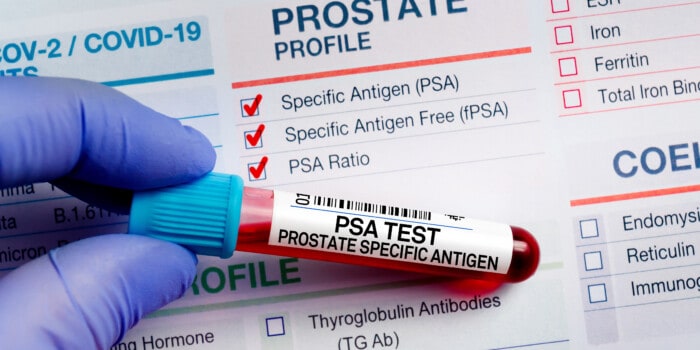Non-invasive biomarker tests help inform clinical decision making for prostate cancer screening, biopsy and treatment.
Prostate cancer is the second leading cause of cancer deaths in American men and the number of advanced cases is increasing 5% annually, according to the American Cancer Society. It is imperative that primary care and urology providers utilize all resources, including biomarker testing, to assess patient risk for prostate cancer and appropriately screen to detect cancer at localized (preferably) or regionalized stages.
It is equally important to avoid overtreatment — in particular to avoid referring patients for biopsy who either do not have prostate cancer or who have low-risk prostate cancer — and refer for active surveillance without the need for biopsy.
Prostate cancer biomarkers tests (PCMs) screen for molecular or genomic markers that have been associated with:
- increased risk of developing prostate cancer
- verification of prostate cancer in cases of conflicting data
- tumor aggressiveness
- prostate cancer-specific mortality risk
- responsiveness to targeted therapies
Below are information hubs that offer resources on specific topics, including relevant articles, journal studies, CMEs and practice resources. If you have any questions or need additional information, please contact us.
Early Detection
The incidence of metastatic prostate cancer has increased for men 45 and older across all races, ethnicities, and geographic locations in the US at the same time routine PSA testing has declined. Multiple studies, including the American Cancer Society’s 2023 Cancer Statistics report, show a strong correlation between the decrease in PSA screening and an increase in metastatic prostate cancer.
View the evidence supporting a return to standardized PSA screening; learn how to use PC biomarker testing to avoid overtreatment, and download resources for use in your practice.

Prostate Cancer Biomarker Guide
Prostate cancer biomarkers (PCMs) analyze a variety of genomic or molecular markers linked to prostate cancer in urine, blood or tissue samples. These tests can help inform your clinical decision making for prostate cancer screening, biopsy and treatment planning.
Get a comprehensive run-down of all PCMs and insights into their diverse applications for precise diagnostics and enhanced patient care.; download resources to help guide your use of PCMs in practice.

Ordering Prostate Cancer Biomarker Tests
Healthcare providers interested in ordering any of the PCM tests featured on this website can find links to additional information and ordering instructions here.
For patients interested in ordering the tests, please share your interest with your healthcare provider who can order the tests on your behalf.

